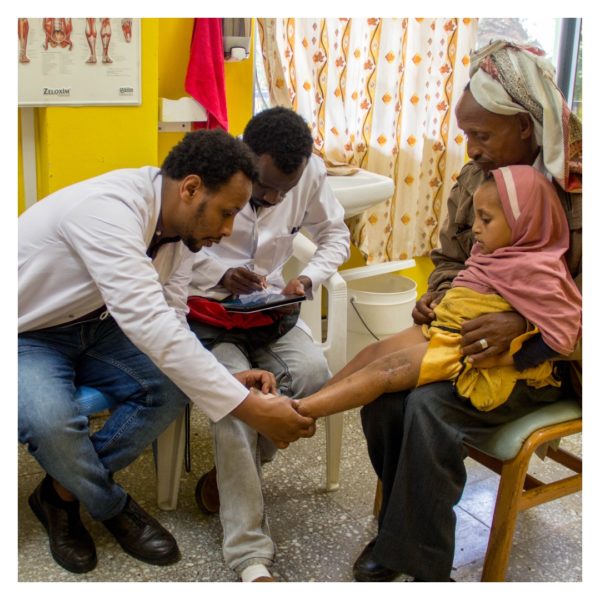Can mission hospitals contribute to capacity building?
CURE International is well-placed within the countries it serves to help foster change in surgical expertise through training and hosting international experts. CURE strives to be an effective partner with each nation’s healthcare program, treating patients for whom there is neither the capacity nor the expertise available in the government sector.
However, CURE’s role goes even further. Many CURE hospitals train local surgeons, building up the national surgical capacity in general and specifically the capacity to provide high-quality paediatric orthopaedic healthcare services. For example, in Ethiopia, orthopaedic residents from each of the four training programs in the country (Addis Ababa University, St. Paul’s Hospital MMC, Bahir Dar University, and Mekele University) come to the CURE Ethiopia Children’s Hospital, rotating through for their paediatric orthopaedic attachment.
From the CURE faculty (three of whom are fellowship-trained in paediatric orthopaedic surgery), the residents learn how to assess children with musculoskeletal disability and become familiar with some routine surgical procedures. They also see how patient-centred care can be offered and have the opportunity to observe a surgical environment where safety is of paramount importance.
For those who wish to continue on with their education and seek a specialized study, the CURE hospital has established a fellowship-training program that is now in the third year. This fellowship training program is available to residents on completion of their standard training, and graduates of the program are already working in Ethiopia’s two largest government hospitals, the Tikur Anbessa Specialised Hospital (also known as the Black Lion Hospital) and the Aabet Hospital. Both of these hospitals are in Addis Ababa, however in time this program will bring forward a team of paediatric orthopaedic surgeons who will work in the main tertiary centres throughout Ethiopia, training others to provide timely, excellent surgical services for children throughout Ethiopia. This will go a long way towards increasing accessibility to much-needed specialized surgical care for the more than 40 million people of Ethiopia, many of whom live far from hospitals which offer these services.
Through their strong network and connection to the global medical community, CURE hospitals are regularly able to host renowned surgeons from Europe, North America, Asia, and Australasia. These specialists give of their time and expertise freely and are able to treat children with complex pathologies while also spending time training local surgeons. This generosity has a profound effect on many local surgeons, who are inspired to strive towards clinical excellence in their work and to offer world-class care to some of the most economically-disadvantaged children in the world.
The ability of CURE hospitals to provide a ‘safe-landing’ for these visiting surgeons is another draw. By ensuring that patients who can benefit from their expertise have been identified, as well as identifying and gathering together trainees for instruction, CURE is able to help visiting surgeons maximize the impact of their stay. This is deeply fulfilling for visiting surgeons, who often make repeated visits based on these positive experiences. In addition, subspecialty programs have developed, mentorships have flourished, and international training opportunities have been made available, all of which have significantly helped develop the capacity of Ethiopia’s healthcare system.
Research is another area where the CURE hospitals have been able to have a high impact. High-quality research generates the evidence base that informs medical practice. However, the great majority of peer-reviewed literature on surgical care comes from high-income countries with a scarcity of high-quality research on problems and pathologies facing Low- and Middle-Income Countries. CURE International has a long history and a proven track record of providing high quality care in hospitals located in LMICs, as well as producing quality research on topics rarely covered, including optimal care for chronic osteomyelitis, the effect of HIV with arthroplasty and fracture healing, untreated clubfoot, and endoscopic third ventriculostomy for hydrocephalus. Such important work requires a long-standing commitment from CURE in the countries where we serve, as well as a team of international and local healthcare professionals who strive to improve healthcare and refuse to accept the status quo.
In conclusion, there is no limit to the change that can be fostered by a small, well-run NGO hospital when it is willing to become a key player in the national healthcare system and leverage its international network of resources for the good of the country and its population. It is inspiring to be a part of such an institution and a joy to see tangible change on a national level.
Read more about our commitment to essential surgery at cure.org/uhc
Footnote: Article written by Rick Gardner on Monday, September 16, 2019
